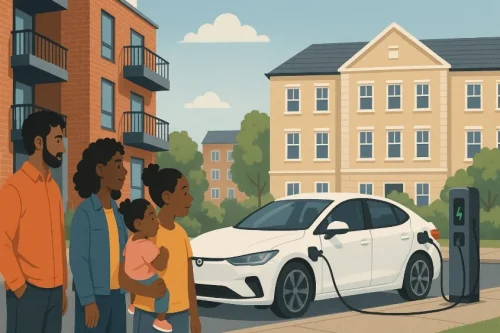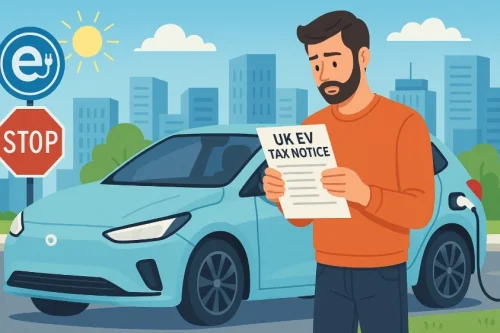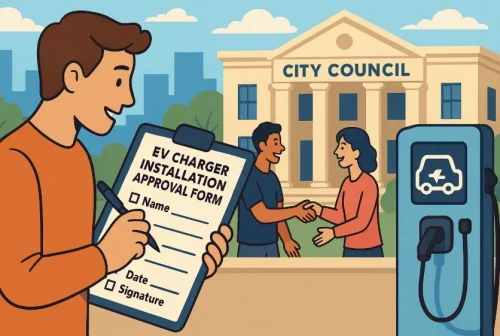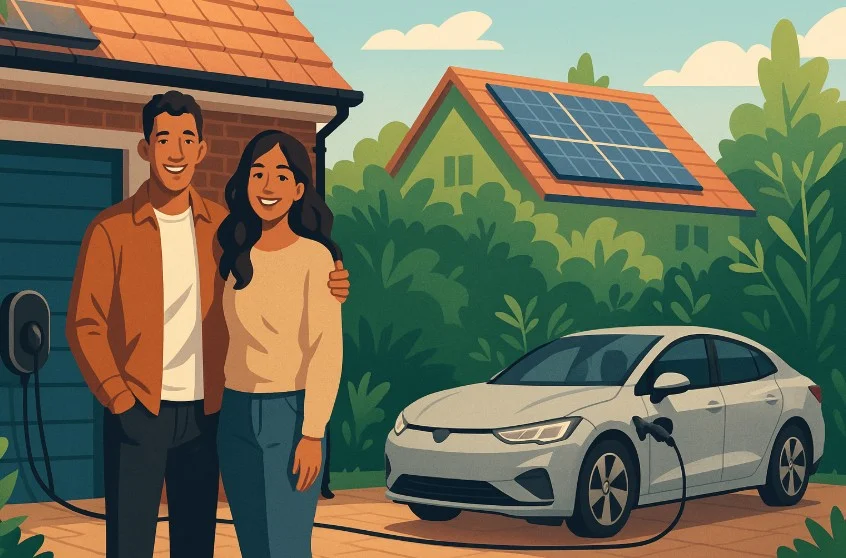Table of Contents
The UK’s transition towards electric vehicles (EVs) has taken a significant leap forward with the introduction of new legislation aimed at making EV ownership more cost-effective and accessible, especially for those without private driveways.
The UK electric vehicle charging law is set to transform how and where EV drivers charge their vehicles, unlocking cheaper charging options that could reduce running costs to as low as 2p per mile.
This landmark move reflects the government’s wider goal of achieving net-zero emissions by 2050, while addressing cost barriers, infrastructure limitations, and inequalities in charging access.
For EV owners and prospective buyers, these changes offer new opportunities for savings, convenience, and long-term sustainability.
What is the New UK Electric Vehicle Charging Law, and Who Does it Affect?

The newly introduced law focuses on extending EV charging access to UK residents who previously lacked viable options, particularly renters and leaseholders without private driveways.
Until now, many have faced higher costs by relying on public chargers or have struggled with permissions to install home chargers.
Key changes include:
- Mandatory EV charge points in covered car parks for leasehold properties
- Reduced red tape for renters to install EV chargers
- Standardisation of charging permissions, improving accessibility and convenience
This law bridges the gap between property owners and those in shared or rented accommodations, making affordable EV charging a nationwide reality.
How Does the 2p-per-mile Cost Work for EV Drivers in the UK?
Under this law, EV drivers using domestic energy tariffs for home charging can benefit from a running cost of approximately 2p per mile.
This is calculated based on efficient EV consumption (3–4 miles per kWh) and access to cheaper overnight energy rates from EV-specific tariffs.
Per-Mile Cost Comparison:
| Vehicle Type | Charging/Fuel Source | Estimated Cost per Mile |
| EV (home charging) | Domestic EV tariff | 2p |
| EV (public charging) | Rapid chargers (avg) | 10–20p |
| Petrol vehicle | Petrol @ £1.50/litre | 13p |
| Diesel vehicle | Diesel @ £1.55/litre | 14p |
These savings are most accessible to users who charge at home, further incentivised by the new law’s provisions for easier at-home charger installations.
Why is the Government Changing EV Charging Regulations Now?
The reform is driven by a mix of environmental and economic factors. With rising EV adoption, the government identified a gap in infrastructure equity and is acting to support the transition more effectively.
Key motivations behind the law:
- Support Net-Zero targets: Reducing transport emissions by enabling broader EV adoption
- Ensure fairness: Giving equal charging access to renters and those in urban housing
- Cut energy costs: Promote domestic tariffs over expensive public charging options
- Stimulate industry growth: Boost demand for chargers, installation services, and clean energy
This strategic change is about more than just energy access, it’s about setting up the EV ecosystem for long-term scalability.
Where Can EV Drivers Now Install Chargers Under the New Law?

The new charging law greatly expands the locations where EV drivers can install chargers, especially for those previously disadvantaged by their living circumstances.
Covered Car Parks and New Developments
Property leaseholders are now required to install EV chargers in covered communal car parks, which are typically found in blocks of flats and apartment complexes.
This change allows a large portion of urban residents to enjoy the benefits of home charging for the first time.
Cross-Pavement Charging Permissions
Ongoing consultations aim to remove barriers around cross-pavement charging, which previously required complex permissions from local councils.
These proposals would let individuals without driveways run charging cables from their homes to the street using safe, approved covers and channels. This could be a game-changer for millions living in terraced housing.
What Financial Savings and Benefits Can EV Owners Expect?
For prospective and current EV owners, the financial case for switching is becoming stronger thanks to these legislative updates.
The Government estimates that drivers without driveways will save up to £250 in planning and application fees that were previously needed to gain approval for charger installations.
Beyond this upfront saving, the long-term reduction in fuel costs is perhaps the most compelling advantage.
Cost Comparison: Home vs Public Charging
Public charging can cost more than five times the price of home charging. Over a year, this difference can translate into hundreds of pounds in fuel savings for a single vehicle.
| Charging Method | Approx. Annual Cost (12,000 miles) |
| Home Charging (2p/mile) | £240 |
| Public Charging (10p/mile) | £1,200 |
| Petrol Vehicle (13p/mile) | £1,560 |
Potential Savings Over the Vehicle Lifetime
Over a standard vehicle lifespan of 8–10 years, an EV owner using home charging could save £10,000 or more compared to running a petrol car. These savings, combined with reduced maintenance costs and future incentives, present a compelling case for EV ownership.
What is the Planned 3p-per-mile EV Tax and How Will It Impact Drivers?

In response to falling fuel duty revenues, the government is preparing to introduce a 3p-per-mile tax on electric vehicles from 2028, a change that could add around £250 annually to the average EV driver’s expenses.
Key points of the proposed tax:
- Applies to EV and hybrid vehicles
- Based on estimated annual mileage, with top-ups if estimates are exceeded
- Aligned with Vehicle Excise Duty (VED) and possibly bundled as “VED+”
- No real-time tracking, avoiding privacy concerns
Though controversial, the tax is designed to create parity with petrol car drivers who currently contribute around £600 per year in fuel duty. Hybrid drivers may face lower rates under the new scheme.
How Will the New Regulations Impact EV Infrastructure Across the UK?
A critical component of the UK’s EV transition is the development of widespread and accessible charging infrastructure. The new law is expected to accelerate this rollout in several ways.
Firstly, by mandating charge points in newly built properties and commercial car parks, the base infrastructure will expand significantly. Secondly, by making charger installations easier in existing housing, the number of home charge points will rapidly increase.
The private sector is also expected to step in, supported by government incentives and a clearer legal framework. The long-term vision is for EV chargers to be as common and reliable as petrol stations once were, but cheaper and more sustainable.
What Legal and Planning Barriers Are Being Removed to Support EV Adoption?

Historically, one of the most frustrating barriers for potential EV owners was obtaining permission for charger installation. The new framework is simplifying this process.
Key changes include:
- Eliminating unnecessary planning approvals for chargers in leasehold and rented homes
- Standardising cross-pavement permissions to make public footpath charging feasible
- Clarifying landlord obligations for tenant charger requests
These efforts ensure the UK’s move to electric is inclusive, removing bottlenecks and delays that have stifled progress.
What Does This Mean for the Future of Electric Vehicles in the UK?
The UK electric vehicle charging law represents more than just an infrastructure upgrade, it signals a transformative shift in how the country supports cleaner, more sustainable transport.
By making EV charging more accessible and affordable, the Government is laying the groundwork for mass adoption of electric vehicles. With supportive policy, industry growth, and improved consumer confidence, the UK is well-positioned to remain a leader in the global EV market.
This legislation also ties into broader objectives, including the commitment to ban new petrol and diesel cars by 2035 and achieve net-zero emissions by 2050. With these latest reforms, the UK is not only preparing its roads but also its economy, its energy sector, and its citizens for a more sustainable future.
Conclusion
The UK electric vehicle charging law is more than a cost-saving measure, it’s a foundational shift in how the country approaches green mobility.
By bringing affordable EV charging to renters, leaseholders, and drivers without private driveways, the government is ensuring a fairer and more inclusive transition to electric transport.
With costs dropping as low as 2p per mile, infrastructure growing across the UK, and legal barriers being stripped away, the path to electric vehicle adoption has never been clearer.
For EV drivers and the wider industry, these changes represent a powerful commitment to sustainability, innovation, and equitable progress.
Frequently Asked Questions
Are private landlords required to provide EV charging points under the new law?
While not all landlords are required, those managing properties with covered car parks or communal parking areas may be obligated under the new legislation.
What are the cheapest domestic EV tariffs currently available in the UK?
Some energy providers offer night-time EV tariffs starting as low as 7p per kWh, specifically for charging during off-peak hours.
Can local councils restrict EV charger installations on public footpaths?
The government is working on easing planning restrictions, but local councils currently still hold the authority. New standardised rules are expected soon.
Do hybrid vehicle owners qualify for the 2p-per-mile rate?
No. Hybrid vehicles do not typically benefit from the same low-cost charging unless they are plug-in hybrids with substantial electric-only ranges.
How will enforcement of the upcoming per-mile EV tax be handled?
Drivers will estimate mileage yearly and pay accordingly. Adjustments will be made based on overuse or underuse, avoiding real-time tracking for now.
Will renters be able to claim government support for EV charger installations?
Yes, provided they have landlord approval. Several grants and schemes are being made available to assist with installation costs.
How do these new laws compare to EV policies in other European countries?
The UK is ahead in legislation focused on rental and leasehold properties, but countries like Norway lead in public charger density and EV subsidies.




